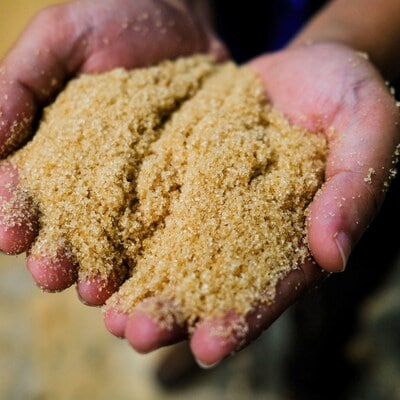The central government has proposed allowing the sale of raw sugar on the domestic market, a measure that would overturn a regulation in force for more than six decades, which restricted the sale of the product exclusively for export, according to a report by The Economic Times. The proposal is part of the draft ‘Sugar Control Order of 2024’, issued by the Ministry of Consumption, Food and Public Distribution.
“Raw sugar” means unwashed centrifuged sugar with a minimum polarization of 96.5 degrees Z, surrounded by the original molasses film, derived from sugar cane. “Refined sugar” means purified and crystallized saccharose (sucrose) with a polarization of not less than 99.8 degrees Z.
The draft regulations, which seek to amend the existing Sugar Control Ordinance of 1966, have been brought in response to technological advancements in sugar production processes. Indian sugar mills have traditionally produced raw sugar only for export to foreign refineries, where it is refined into consumable sugar.
“Raw sugar is priced higher than refined sugar, and its sale in the domestic market could be very beneficial for the industry,” an official told the Economic Times. The proposed changes would also extend to traditional sweeteners like gur (jaggery) and khandsari (a type of unrefined sugar).
According to the new proposal, khandsari units with a capacity to crush more than 500 tonnes of cane per day will be included in the regulatory relaxation, while smaller-scale units will not be affected. Currently, these units do not adhere to the Fair and Remunerative Price (FRP) norms, nor are they subject to quotas for the sale of their produce, which has led to distortions in the sugar sector and prices, the official said. “This also results in farmers missing out on the benefits of FRP,” the official added.
The Ministry has requested that interested parties submit their comments on the draft proposal by September 23.
The draft regulation also proposes to give the government the power to regulate sugar prices, taking into account factors such as the retail price of sugarcane, the approximate cost of converting sugarcane or sugar beets into sugar, and the average income from by-products of sugar production. It also outlines the government’s power to conduct inspections, searches, and seizures related to sugar production.
The bill further specifies the Centre’s authority to impose restrictions on the sale, storage and disposal of sugar by producers and traders.
If implemented, this regulation could mark a significant transformation in India’s sugar industry, potentially boosting domestic sales of raw sugar and bringing economic benefits to the sector. However, the final decision will depend on the response received from stakeholders and further deliberations by the government.
First published: August 29, 2024 | 10:17 am IS
Disclaimer:
The information contained in this post is for general information purposes only. We make no representations or warranties of any kind, express or implied, about the completeness, accuracy, reliability, suitability or availability with respect to the website or the information, products, services, or related graphics contained on the post for any purpose.
We respect the intellectual property rights of content creators. If you are the owner of any material featured on our website and have concerns about its use, please contact us. We are committed to addressing any copyright issues promptly and will remove any material within 2 days of receiving a request from the rightful owner.

